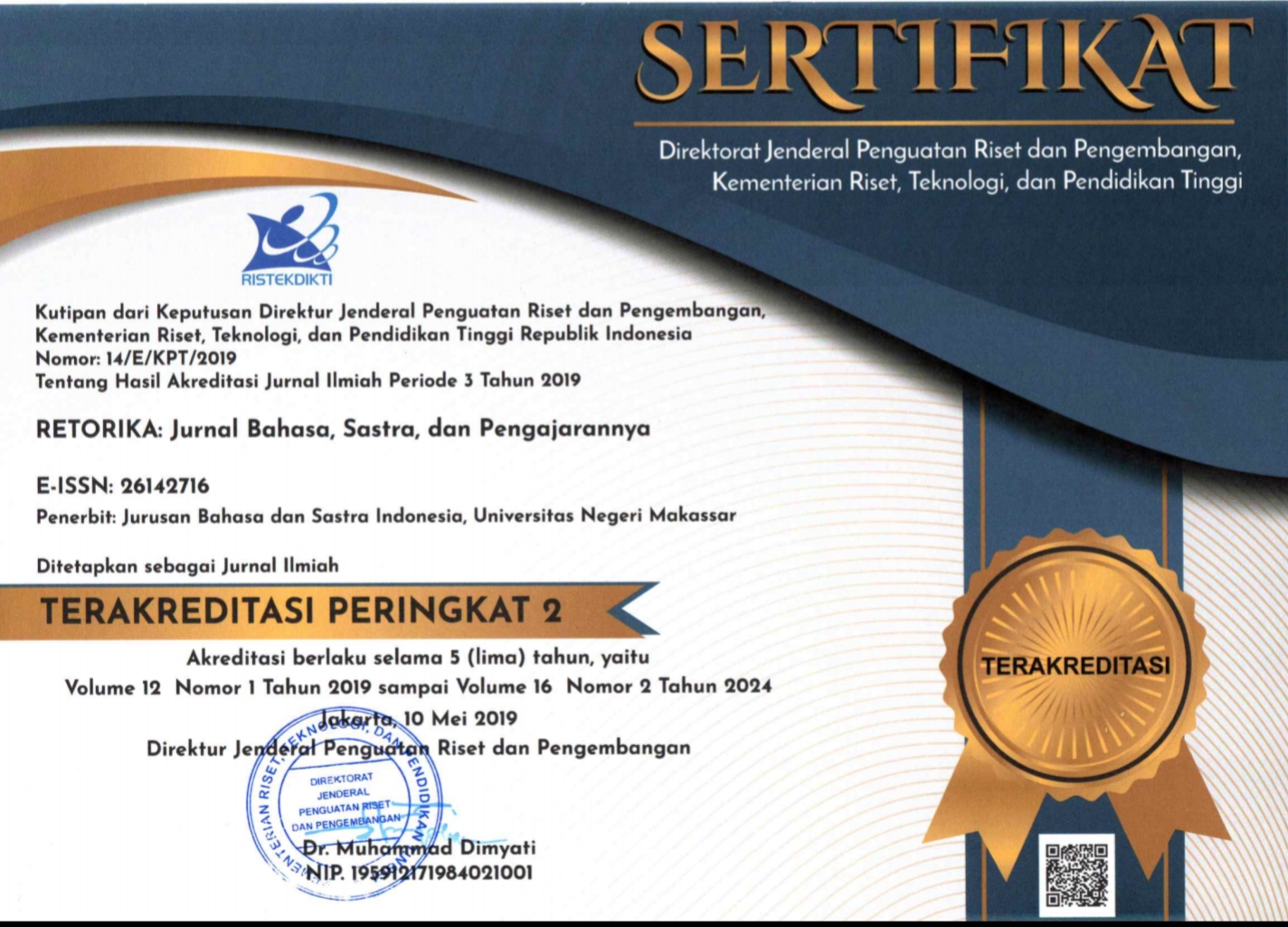ETHNOSEMANTICS STUDY OFLEXICON “KUBURAN”IN THE TORAJA PEOPLE
(1) Universitas Negeri Makassar
(2) Universitas Fajar
(3) Graduate School of Humanities and Sciences, Nara Women’s University
(4) Universitas Hasanuddin
(*) Corresponding Author
DOI: https://doi.org/10.26858/retorika.v13i2.13804
Abstract
This research aims to explain the Toraja people’s perspectives regarding the lexicon of kuburan existed in their area. This is a qualitative research using the ethnosemantic approach. Data related to the lexicon of kuburanin the Toraja people were collected by interviewing the natives and traditional leaders there. The data collected then were analyzed using the componential analysis to find out the features from each lexicon of kuburan, so then it can be discovered how the cultural influences of the Toraja people affect the various lexicons of kuburan. The result of this research shows that there are nine lexemes of kuburanknown by the Toraja people, such as liangsilli, liangerong, liang toke, liangpak, tangdan, patani, lamunan, and pasillirankayu. These nine lexemes can be classified based on their social stratification level, age category, and any shapes or positions of the grave. Generally, each lexeme has differences in their function and features. The Toraja culture considers death as the orientation in life. Hence, they relate many things to death, and one of them is grave.
Keywords
Full Text:
PDFReferences
Agyekum, K. (2017). The Ethnosemantics and Proverbs of ohia,‘“poverty”’in Akan1. Legon Journal of the Humanities, 28(2), 23–47.
Amer, A. (2018). Teaching/Developing Vocabulary Using Semantic Feature Analysis. The TESOL Encyclopedia of English Language Teaching, 1–7.
Arif, Humaini. (2007). The Lexicon of Camel in Arabic Language: A Study of Ethnosemantics Thesis. Yogyakarta: Faculty of Cultural Sciences, Universitas Gadjah Mada.
Bender, A., Beller, S., & Medin, D. L. (2017). Causal cognition and culture. The Oxford Handbook of Causal Reasoning (Kindle-Version). Oxford University Press, Oxford.
Clayton, T. (2017). Transition, culture, and language in Cambodia. In Language policy, culture, and identity in Asian contexts (pp. 105–128). Routledge.
Costa, A., & Pickering, M. J. (2018). The role of learning on bilinguals’ lexical architecture: Beyond separated vs. integrated lexicons. Bilingualism: Language and Cognition, 1–2.
Damayanti, W., & Afidah, N. N. (2018). The Lexicon of the verb “Like” of Geographic’s Toponymic at West Java: Study of Ethnosemantic. IOP Conference Series: Earth and Environmental Science, 145(1), 12118. IOP Publishing.
Donald, M. (2017). Key cognitive preconditions for the evolution of language. Psychonomic Bulletin & Review, 24(1), 204–208.
Fahmi Aajami, R. (2019). A Cognitive Semantic Analysis of Meaning Interrelationship. Arab World English Journal (AWEJ) Volume, 10.
Farr, J., Blenkiron, L., Harris, R., & Smith, J. A. (2018). “It’s My Language, My Culture, and it’s Personal!” Migrant Mothers’ Experience of Language Use and Identity Change in Their Relationship With Their Children: An Interpretative Phenomenological Analysis. Journal of Family Issues, 39(11), 3029–3054.
Hidayah, Nuril. (2011). The Lexicon of Woman Based The Physical Traits in Arabic Language. Thesis. Yogyakarta: Faculty of Cultural Science, Universitas Gadjah Mada.
Holmes, J., & Wilson, N. (2017). An introduction to sociolinguistics. Routledge.
Koptjevskaja-Tamm, M., Rakhilina, E., & Vanhove, M. (2015). The semantics of lexical typology. Routledge.
Laplanche, J. (2018). The language of psychoanalysis. Routledge.
Mercer, S., & Kostoulas, A. (2018). Language teacher psychology. Multilingual Matters.
Ottenheimer, H. J., & Pine, J. M. S. (2018). The anthropology of language: an introduction to linguistic anthropology. Cengage Learning.
Pennycook, A. (2017). The cultural politics of English as an international language. Routledge.
Phillips, N., & Malhotra, N. (2017). Language, cognition and institutions: Studying institutionalization using linguistic methods. The SAGE Handbook of Organizational Institutionalism, 392, 417.
Verhoeven, L., Steenge, J., van Leeuwe, J., & van Balkom, H. (2017). Componential skills in second language development of bilingual children with specific language impairment. Topics in Language Disorders, 37(2), 154–169.
Watts, L. K. (2018). Toward Reinvigorating an Ethnolinguistic Approach to the Study of ‘Kin Terms’: A View from Nascent-based Zuni Relational Terminology. AND EXTENSION IN KINSHIP, 303.
Williams, C. (2018). Lexical semantics and the Latin vocabulary of unmanly men. Sex in Antiquity: Exploring Gender and Sexuality in the Ancient World, 461.
Xenia, T. (2019). The Contrastive Componential Analysis of the English Verb “to love.” Journal of Language and Literature, 19(1), 65–71.
Yusri, Y., & Barumbun, M. (2013). POTRET PERGESERAN MAKNA BUDAYA MA’NENE DI KECAMATAN BARUPPU KABUPATEN TORAJA UTARA PROVINSI SULAWESI SELATAN. Sosiohumaniora, 15(3), 330–336.
Yusri, Y., & Hidayat, A. R. (2016). Geographical Influences on the Language Skill of Elementary School Students in Lae-Lae Island Makassar City. Jurnal Humaniora, 28(2), 208–214.
Article Metrics
Abstract view : 404 times | PDF view : 45 timesRefbacks
- There are currently no refbacks.
Copyright (c) 2020 Hasmawati Hasmawati, Yusri Yusri, Alifia Masitha Dewi, Jamaluddin Gesrianto

This work is licensed under a Creative Commons Attribution-NonCommercial 4.0 International License.
Published by:
Department of Indonesian Language, Faculty of Languages and Literature, Universitas Negeri Makassar in cooperate with Asosiasi Dosen Bahasa dan Sastra Indonesia (ADOBSI) and Ikatan Program Studi Pendidikan Bahasa dan Sastra Indonesia (IKAPROBSI).
Address: Department of Indonesian Language Office, DG Building Second Floor, UNM Parangtambung, Daeng Tata Raya Street, Makassar, South Sulawesi, Indonesia
 Email: retorika@unm.ac.id
Email: retorika@unm.ac.id

RETORIKA: Jurnal Bahasa, Sastra,dan Pengajarannya is licensed under a Creative Commons Attribution-NonCommercial 4.0 International License.
















